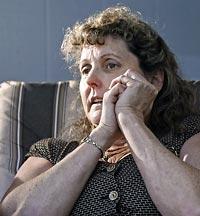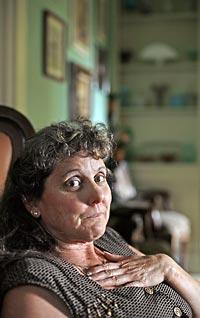Rape victim tells her story: "He's always right there"

YAKIMA — Last month, Julie Harmia pulled the battered, dog-eared book off her bookshelf and handed it to her adult son.
It was a true-crime account of the infamous South Hill rapist of Spokane. It was autographed by the author, Jack Olsen: "for Julie, a lovely lady, with many thanks."
Harmia's rape was on Page 200. Her 19-year-old son was dumbstruck. "Mom, you never told us ... " he said.
For most of her adult life, Harmia kept a wall around the evening of Oct. 23, 1980. She did not tell her son, daughter or even a therapist until recently. She has no photos from that time of her life.
But she still hears the precise diction in rapist Kevin Coe's voice. She feels the dry grass and thorns of the vacant lot where she was thrown down. She sees the stitching on the tan leather glove Coe shoved deep into her mouth to silence her.
Coe was to get out of prison next Friday after 25 years. Instead, the state attorney general filed a petition to commit him to McNeil Island as a sexually violent predator. Coe's commitment trial, which has not been scheduled, will be the most high-profile since 1991, when Washington began holding sex predators after their release from prison. Until then, he stays in custody.
Harmia, who now lives in Yakima, will likely see Coe again at that trial, from the witness stand. Although Spokane police think Coe raped as many as 43 girls and women between 1978 and 1981, Harmia's is the only conviction that withstood Coe's barrage of appeals.
Two weeks ago, Harmia started preparing for another day in court by telling her son, then her 21-year-old daughter, about the rape. She wants to remind people of Kevin Coe and his "reign of terror."
"We need to reacquaint the public with the travesty and what a monster this man is, and let them understand that this man can never be in public," said Harmia, a soft-spoken 53-year-old with gray twists in her brown hair. "He is a menace to society. He needs to be committed for the rest of his life."
Coe is still with her. In a recurring vision, he is perched on a tree branch outside her old bedroom window in Spokane.
"I always picture him in that tree, watching me, ready to kill me," Harmia said. "That's something that's always been in my peripheral vision for 26 years. He's always right there."
"Someone had just shattered our lives"
Julie Harmia moved to Spokane as a newlywed in the fall of 1980 to follow her husband's work.
The couple's real-estate agent warned them of a string of rapes in the affluent, tree-lined South Hill neighborhood a few miles west of their home. But Harmia, then 27, had backpacked through Europe alone and had moved to Hawaii by herself at age 17. She felt she could take care of herself.
Oct. 23, 1980, was her first day of work at a downtown jewelry store. It was dusk when she got off the bus. She hunched into her camel-colored wool coat against the chill. She saw a jogger run past her, then duck behind a car parked on the street ahead. She was distracted, thinking about decorating her new house.
She got a good look at Coe as she walked by the car. He swiveled left, right, looking. He wore gray jogging pants and blue and gray Nike shoes. He had a cleft in his chin.
Coe grabbed her around the waist. He shoved his gloved hand into her mouth. He dragged her to the vacant lot.
She has forgotten how long the rape took. But she remembers his fist "like a hammer" on the left side of her head. He switched hands in her mouth, shoving gravel and thistles down her throat. She bit hard enough through Coe's glove to leave blood — Coe's type A blood — on her coat.
As he left, he warned her, "If you go to the police, they cannot protect you 24 hours a day, and I will come and I will kill you."
Harmia believed him. "He was going to do it, there was no doubt in my mind."
She rushed, bloodied and missing a shoe, to a neighbor's house. Coe's threat was so vivid Harmia was unsure if she wanted to call police. But the neighbor, a retired firefighter, called without asking her. A doctor said her throat looked as if it had been rubbed with heavy-grit sandpaper. She had badly bruised ribs, cuts and vaginal tears.
She quickly adopted a German shepherd named Tuffy. Her husband, Lewis, bought a .357-caliber Magnum. When he worked late or traveled, she would go directly from her work to their neighbor's house, then would sleep in her basement with the dog. She wanted to be far from the tree branch upstairs.
Another victim, a popular Spokane disc jockey, talked publicly about being raped, but Harmia tried to cover her secret like a scar. She had to walk past the vacant lot every day but would avert her eyes.
"It was like someone had just shattered our lives," Lewis Harmia said.
"Wall-to-wall women"
In the months after Harmia's attack, fear of a rapist masquerading as a jogger seized Spokane. Men training for the city's signature event, the Bloomsday run, began wearing T-shirts declaring "I am not the South Hill rapist."
A local newspaper, the Spokane Daily Chronicle, set up a witness tip line, piped directly to the office of Managing Editor Gordon Coe, Kevin's father. By then, detectives were already tailing Kevin Coe, and they arrested him March 10, 1981, five months after Harmia's rape.
In the dim light of that vacant lot, Coe looked to Harmia somewhere between Erik Estrada of the TV show "ChiPs" and "the dark fellow on Starsky and Hutch." In reality, Coe was light-skinned with sandy brown hair. But a composite sketch based on Harmia's description shows she nailed his high cheekbones, deep-set eyes, square jaw and his build.
The day of Coe's arrest, Harmia went to police headquarters to try to identify her attacker in a lineup. She was stunned when detectives ushered her into a waiting room.
"It was wall-to-wall women," Harmia said. "The enormity of the situation really became clear."
She picked Coe out by sight, then fought the urge to throw up when she heard his precise diction. "It's like your body wants to lose control over itself," she said. "There's another side of you that just wants to reach out and smack him or throttle him ... but you're too afraid to do anything."
Unlike other women in the room that day, Harmia had not been hypnotized by detectives during the investigation, because her description was so detailed.
Four months later, in July 1981, Harmia testified at trial. Coe was convicted of her rape and three others. Roy Allen, a now-retired detective on the South Hill rapist detail, said last week that Harmia's testimony was crucial.
"He spent 25 years based on it," Allen said. "And he's spent all this time trying to tear down her testimony, and rationalizing each piece."
Coe started as soon as he got to prison. In a 23-page letter sent to a friend from prison in 1982, Coe seized on Harmia's initial description. And Harmia's testimony that she had walked past Coe while he crouched was "not reasonable ... in the height of a rape spree," he wrote.
"Her story was on the verge of preposterous!" wrote Coe. "Some who've studied my case carefully think this woman may not have been 'raped' at all — but rather was beaten by her husband. We may never know ... ."
In an interview with The Seattle Times last week, 25 years into his sentence, Coe again said the evidence against him is inconclusive.
"The only thing that matches is blood type, and that's 37.9 percent of the world's population," he said. "It's an incredible bad-luck thing for me, just like the whole case."
"You'd never leave your closet floor"
A year after the trial, Harmia joined a softball league and began making friends. She learned to compartmentalize. "If you did nothing but dwell on this, you'd never leave your closet floor," she said.
She and her husband moved to Texas a few years after the trial and had a baby girl. But their brief respite from Coe ended with a phone call from Spokane in 1984: Coe's convictions had been overturned by the state Supreme Court because of the use of hypnosis. Harmia would have to testify again.
His second trial was held in Seattle, but the media barrage was no less intense. By then, Coe's mother, Ruth, had been convicted of trying to hire a hit man to kill the judge and prosecutor in his first case. Olsen, a Bainbridge Island author, had published his book, "Son: A Psychopath and His Victims," which was later made into a TV movie.
Police whisked the Harmias and their 3-month-old daughter from the airport to the back entrance of a downtown hotel.
She testified the next day and still remembers the feeling of being "shark bait" under withering cross-examination by Coe's new, more aggressive attorneys. Her daughter wailed on the flight home.
The second jury came to much the same conclusion as the first: Coe had raped Harmia and two others. He would remain in prison for at least 40 years, a virtual death sentence.
Harmia's relief did not last. She had developed a sleep disorder after the rape, sleeping no more than four hours at a time. They had changed homes and cities, but Coe still lurked on the tree branch.
In 1985, the state Parole Board, noting that Coe had refused treatment and even a meeting with the board, said this: "Mr. Coe represents not only a danger to the unsuspecting public, but to his former rape victims who testified against him."
"I'm the only one keeping him in jail"
During the second trial, the judge had tried to allow some testimony that victims gave before being hypnotized. But in 1988, the state Supreme Court again sided with Coe, saying hypnosis had so tainted the women's testimony that it wasn't reliable. The court upheld the one conviction that did not rely on hypnotized memory: Harmia.
She does not remember how or when she learned that. Although Harmia had signed up with the prosecutor to be notified of changes in Coe's case, the couple got most of their news from friends in Spokane.
"For a while, I've felt like I'm the little Dutch boy with my finger in the dike," she said last week. "I'm the only one keeping him in jail."
Coe continued to challenge Harmia's rape, arguing in federal court that prosecutors wronged him when they threw out semen evidence taken from his alleged victims. DNA testing, developed later, could have exonerated him, Coe argued. Coe's last-ditch efforts are still pending in state appeals courts.
"Where is the evidence?" Coe said from prison last week. "How can someone be charged with six counts of rape, and only one count survives all the appeals? That alone should send up amazing warning signs!"
In the years after the court ruling, Harmia tried to distract herself with life: children, work, gardening, anything. The Harmias divorced in 1993. They had never talked in depth about the rape.
But about five years ago, under stress as a special-education teacher, Harmia began having trouble sleeping again. Then she began to get numbness in her left cheek.
She saw a therapist for the first time two years ago. She learned that tissue has its own memory: Her cheek was remembering Coe's attack, even if her brain refused.
In June, an investigator for the Attorney General's Office called to say the state was considering civil commitment. Washington's sexually-violent-predator laws allow the state to hold high-risk sex offenders for treatment after they finish their prison term. Reporters might call, Harmia was told. She may need to testify again.
She now says a sense of duty has displaced some — but not all — of her fear.
"I'm just hoping that my talking will help bring some peace to the 40-some-odd victims whose indictments did not hold," Harmia said. "We were all in this together, even though we never knew each other."
She can now talk about the rape without running through a box of tissues.
"I have to keep Coe at arm's length," Harmia said. "I have to keep him out in the tree. I cannot let him in the house."
Jonathan Martin: 206-464-2605 or jmartin@seattletimes.com


